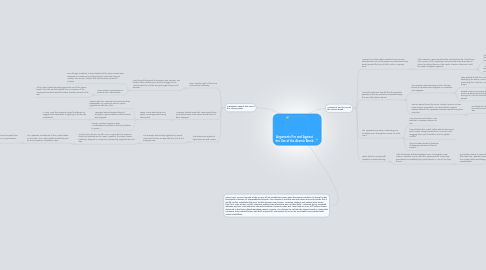
1. Arguments Against the Use of the Atomic Bomb
1.1. It isn't morally right/ Killed more civilians than necessary.
1.1.1. The killing of thousands of innocent men, women, and children whos deaths won't aid the struggle of the Allied powers to end the war goes against any moral decision.
1.1.1.1. Even though President Truman stated that the atomic bomb was dropped on Hiroshima (a military base) to avoid the killing of civilians, the 80,000+ deaths that resulted were almost all civilians.
1.1.1.2. These victims represented no threat tot he United States.
1.1.1.2.1. If the United States decided against the use of the atomic bomb, then the resulted deaths from an invasion of the Japanese homeland would be those directly invloved in the war
1.2. American leaders knew that Japan would have surrendered even if the atomic bomb had not been dropped.
1.2.1. Japan's code was broken and Japan's messages were being intercepted.
1.2.1.1. It was known the Japanese had instructed their ambassador in Moscow to work on peace negotiations with the Allies.
1.2.1.2. Japanese leaders began talking of surrender a year before the atomic bomb was dropped.
1.2.1.2.1. In June 1945, the Emperor himself had begun to suggest that alternatives to fighting to the end be considered.
1.2.1.3. Foreign Minister Shigenori Togo: "Unconditional surrender is the only obstacle to peace..."
1.3. The bombs use sparked a diplomatic war with Russia.
1.3.1. The Russians had secretly agreed they would come into the war 90 days after the end of the European war.
1.3.1.1. Turned out to be on May 8th, so on August 8th, the Russians should've declared war on Japan. However, the atomic bomb had been dropped on Hiroshima, followed by Nagasaki the next day.
1.3.1.1.1. The Japanese surrendered to the United States, no to Russia. The United States would take part on the occupation of postwar Japan.
2. When Harry Truman learned of the success of the Manhattan Projec upon becoming president, he knew he was faced with a decision of unprecedented gravity. The capacity to end the war with Japan was in his hands, but it would involve unleashing the most terrible weapon ever known. American soldiers and civilians were weary from four years of war, yet the Japanese military was refusing to give up their fight. American forces occupied Okinawa and Iwo Jima and were intensely bombing Japanese cities. But Japan had an army of 2 million strong stationed in the home islands guarding against invasion. The decision to unleash the atomic bomb is a topic that continues to be argued today, with both reasons for and against its use on an area highly concentrated with civilian population.
3. Arguments For the Use of the Atomic Bomb
3.1. Advisors to United States President Harry Truman estimated the use of the weapon of mass destruction would prevent the loss of half a million American lives.
3.1.1. After Okinawa, Japan would be the next stop for the Allied forces. If an invasion of the Japanese homeland was to be their plan of action to ending the war in the Pacific Theater, inferences could be made to support against it.
3.1.1.1. The Japanese would fight desperately to defend themselves.
3.1.1.2. An invasion of this scale and magnitude would result in heavy casualties of half a million lives.
3.2. Most of his advisors also felt that the quickest possible to the war could be achieved through the use of the atomic bomb.
3.2.1. The Japanese were standing on their last leg before the bombs were dropped on Hiroshima and Nagasaki.
3.2.1.1. They wanted to halt the Allied advance by destroying the entire American fleet, therefore preventing the Allies from resupplying their ground troops
3.2.1.1.1. The plan required risking the entire Japanese fleet. They took the gamble and lost disastrously - eliminating their fleet as a fighting force in the war.
3.2.1.2. Despite Japan's enormous disadvantage, Truman knew they would fight to the last man, forcing the Allies to continue sacrificing their people.
3.2.2. Truman wished to see the Pacfic Theater come to a close come as soon as possible. He infered that a massive, sudden attack to the Japanese homeland would bring their surrender.
3.2.2.1. He stated the atomic bomb had to be used to shorten the agony of the war.
3.3. The Japanese have been unrelenting and incredibly cruel through the course of World War II.
3.3.1. They have starved, beaten, and executed American prisoners of war.
3.3.2. They attacked the United States without warning at Pearl Harbor, killing thousands of Americans and dragging them out of isolation and into global conflict.
3.3.3. They had abandoned all pretense of obeying international laws of warfare.
3.4. Japan failed to comply with President Trumans warning.
3.4.1. After the bombs first test explosion near Alamogordo, New Mexico, President Truman told the Japanese that, unless they surrendered immediately, they could expect a "rain of ruin from the air".
3.4.1.1. Due to their failure to respond to the warning, it can be inferred that either the Japanese weren't afraid of the attack, believed the United States was blufing, or were preparing for a counterattack.
